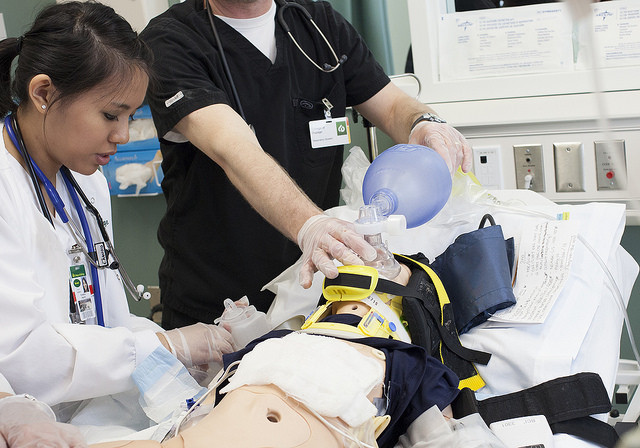
Most would agree that nursing is a helping profession and
thus has an obligation to advocate for social justice. In order to be effective
advocates, nurses at all levels of education need to learn about important
concepts including social determinants of health (SDOH) and health equity.
Moreover, nurses do not work in silos and need an understanding of the
importance of interprofessional education (IPE) and team science. Simulation is an important aspect of clinical
education for nurses, however, when it comes to educating nurses in PhD
programs, simulation is rarely used. Although underutilized, simulation could
be the key to improving IPE and SDOH education to ensure the nursing workforce
is prepared to advocate and improve outcomes for minority and underserved
populations.
In nursing PhD programs, most learning is didactic. Opportunities for hands-on
research activities are often advisor-dependent. Many students are not exposed
to “research-in-action” aside from their own dissertation research, resulting
in missed opportunities and disparities in nursing education. Because we are
training the scientists who will contribute to evidence-based practice
important to health care, we need to improve these currently inconsistent
educational experiences.
The Innovative Solution
As a Macy Faculty Scholar I am developing patient cases using simulation
methods to enhance PhD program curricula by providing nursing students with
experiential SDOH and IPE activities. For example, PhD students could conduct a
focus group with standardized patients acting as members of a vulnerable
population. This would not only provide experience in a qualitative data
collection technique, but also expose the students to potential challenges and
opportunities of working with certain populations.
Titled SiPP, the program will optimize the strengths of simulation to enrich
PhD education in meaningful ways and address the Macy Foundation’s priorities
related to IPE, new curriculum content, improved education, and improved
faculty skills in health professions education. Simulation experiences will be designed to provide PhD students with an
opportunity to be exposed to, and engage with, research and stakeholder teams
that are diverse in many ways, ensuring the next generation of researchers are
equipped to better address SDOH. My goal is to create educational experiences
that expand consciousness instead of perpetuating stereotypes about who can
lead teams or who can and should have a seat at the table.
Currently, SiPP will be grounded in social justice theory and
developed based on Kolb’s Experiential
Learning Model wherein effective learning is seen when a person
progresses through a cycle of four stages. The stages are the concrete
experience, then a reflection on the experience, followed by analysis and
conclusions (learning from the experience), and finally, active experimentation
or trying out what you have learned.
Resources for Success
The PhD program in the College of Nursing (CON) at the University of South Carolina provides a fertile environment to implement SiPP. The course content being delivered uses an executive model, where PhD students come to campus for didactic classroom experiences, research socialization experiences, and other science-focused activities. The CON also has a state-of-the-art simulation lab that, in addition to high fidelity mannequins, utilizes standardized patients (i.e. live actors) to facilitate learning. These resources, along with a supportive Director of Simulation, Dr. Crystal Graham, and an engaged mentor, Dr. Debra Barksdale, will help me drive this project forward.
Vision for the Future
The goal of SiPP is to enrich the academic experience of future nurse
scientists to better engage in social justice activities in research, clinical
practice, and education with a firm understanding of the impact of SDOH and the
power of IPE.
This approach is innovative, transformative, and easily adaptable. Long-term,
SiPP could be expanded to other disciplines to build a cadre of scientists
equipped to be advocates for social justice.
Photo Credit: Flickr/CODNewsroom